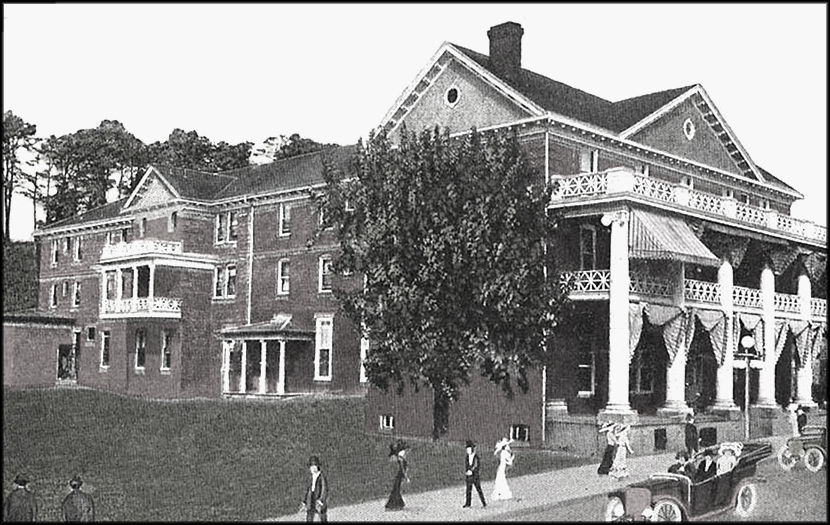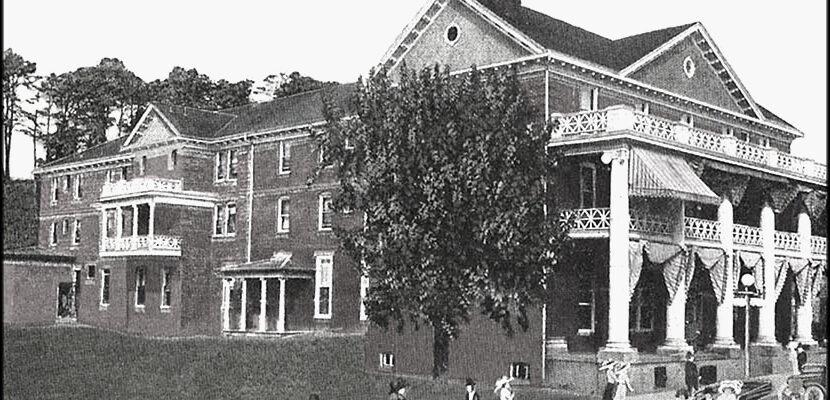The three-story Colonial Hotel that once stood at 215 E. Market Street had six large distinctive white pillars in front, a red brick edifice, a red tiled roof and an open porch at each level on the south end. The large back (north) portion of the complex was built perpendicular to the front section, giving it a “T” shape. In time, 213 E. Market became Colonial Hotel Annex and the property directly across the street turned into the Colonial Hotel Laundry.
The business that opened in 1910 was described in a 1915 Chamber of Commerce report as being “liberally patronized by the best class of the traveling public.” J.L. Murrell was shown as the proprietor. The publication further declared: “The hotel contains 60 rooms, all of which have hot and cold running water, private telephone, private bath connections, electric lights, steam heat and other necessary conveniences of the modern hotel of today.”

An undated penny postcard of the facility described the majestic looking lodge as “Your Home in Our Town.” It showed “Ike Garland – Colonial Hotel – H.C. Seaton, Johnson City, Tenn., in operation for more than 50 years, noted for comfort and hospitality, in the heart of the business district but away from the noise of the railroad.” The latter remark was an obvious jab at the John Sevier, Windsor Hotel and other such establishments that were situated in close proximity to the downtown railroad tracks.
In 1989, Press-Chronicle writer, Tom Hodge, received a letter from Pauline Stone who fondly remembered living in the Colonial Hotel. She recalled seeing the fire wagon coming down Market Street pulled by horses, not powered by a Model A Ford. Likewise, she was living there when the city acquired its first motor driven fire engine.
“I lived in the Colonial Hotel with its stately columns,” said Ms. Stone. “The Boxwood Inn was on the site that is now the John Sevier Hotel. Farther down Market Street was Teilmann’s Greenhouse. I saved newspapers until I had a bundle and took them there and exchanged them for cut flowers. There was a grocery store at the corner across from the Boxwood Inn run by a Mr. Brown.” My April 30, 2007 column contained a photo from Lewis Brown of E.W. Brown standing in front of his 144 E. Market establishment.
Pauline said the manager of the Majestic Theatre lived at the Colonial Hotel and gave her passes to stage shows when the productions came to town. She had recollections of well-known actors staying at the lodge. This was when a person could walk out of the Majestic Theatre, cross Main Street and enter the Edisonia Theatre.
Ms. Stone further recalled that the big social events of winter were Charity Balls that took place at the hotel. Since it did not have a ballroom, tables were removed from the dining room and the maple floor polished. There was an alcove where the orchestra played.”
A humorous incident transpired when the proprietor, Jim Buck, became dissatisfied with his orchestra. Since another orchestral show was performing in town, he went to their hotel and signed them to play a gig at the Colonial. He returned dressed in white tie, tails, tuxedo and wearing an opera coat (ankle length loose-fitting cloak comprised of velvet, brocade or satin). The musicians literally marched through the front door, down the corridor, into the dining room and began playing music for the gala ball.
By the late 1960s, the once grandiose inn, after becoming fragile and aged, fell victim to a wrecking ball to make room for parking space. Another notable downtown landmark became a vanishing memory of yesteryear.
